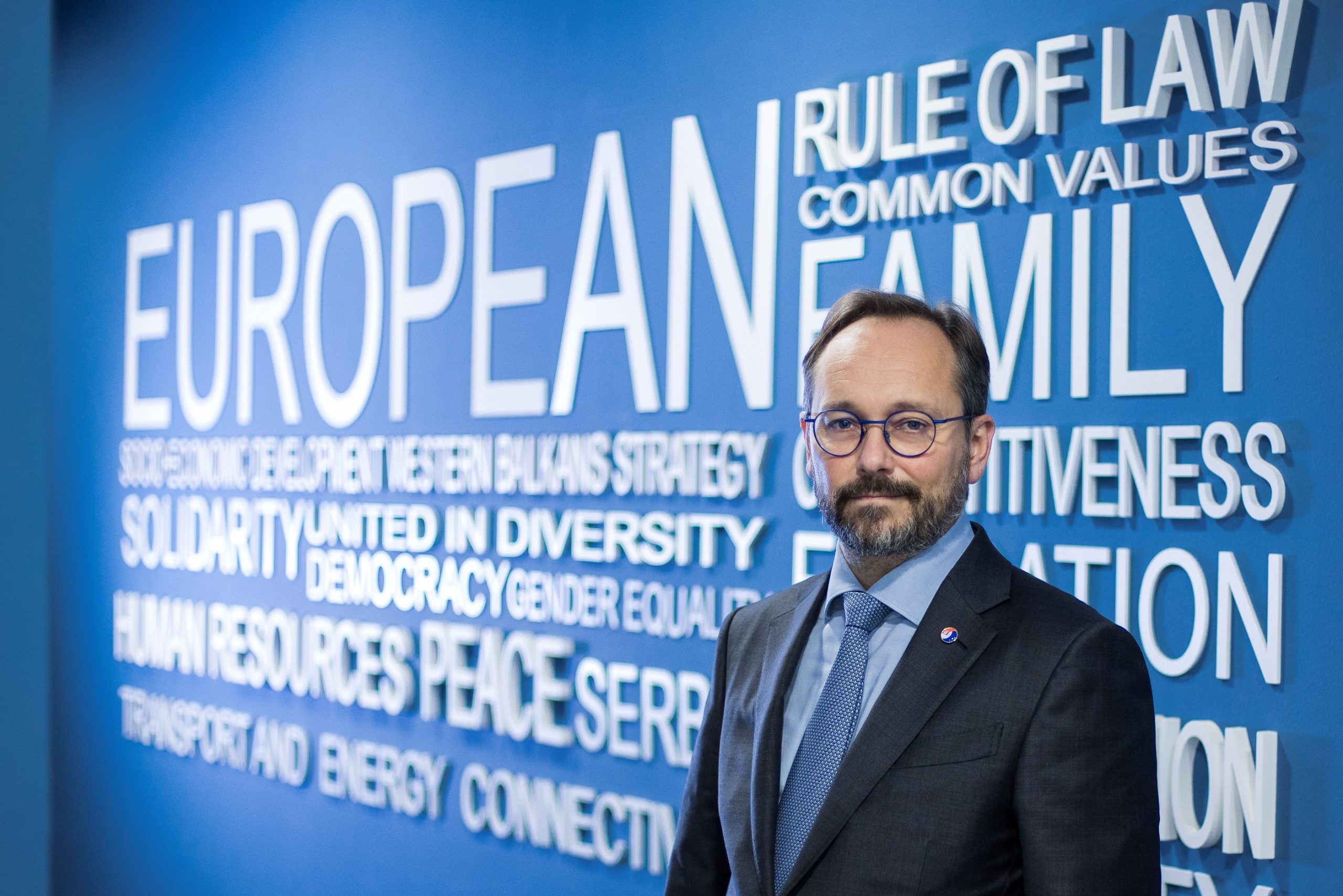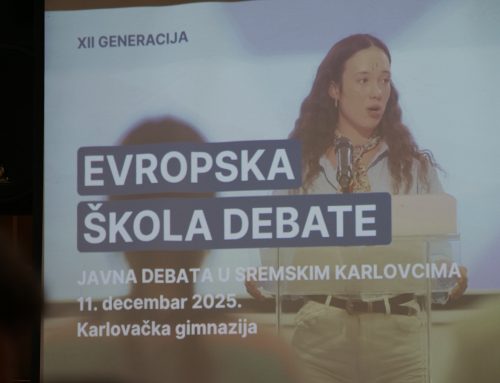“We clearly welcome this vote in the UN. Serbia continues to be an important partner of the EU. We want Serbia to be with us – also in these difficult times and see its alignment with EU statements and measures to stand up to Russia’s blatant aggression”, said EU Ambassador to Serbia Emanuele Giaufret in an interview to Blic.
Danijela Luković: For 12 days now, the war in Ukraine has been raging, do you think that the EU has responded to the crisis in the right way?
First things first: we condemn in the strongest possible terms the unprovoked military aggression against Ukraine. We call on Russia to immediately cease the hostilities, withdraw its military and fully respect Ukraine’s territorial integrity, sovereignty and independence. Our thoughts go to the Ukrainian people who are victims of the Russian attack. It is a huge humanitarian crisis. The attack on a hospital in Mariupol, where maternity and children’s wards were located, is horrific. According to the World Health Organisation Russia has bombed already 18 health facilities in Ukraine –. Innocent civilians are paying the highest price. Our thoughts are also with the Russian people who bravely demonstrated against the war despite repression, even prison.
To revert now: The EU unanimously and quickly responded with the largest economic sanctions package which we are still widening, and with support to the victims. On 1 March, President von der Leyen announced EUR 500 million to deal with the immediate consequences of the war, including for the refugees. We are also supporting Ukraine with military equipment to defend itself with additional 500 m Euros. Furthermore, EU leaders announced the deepening of our partnership with Ukraine in pursuing its European path.
DL: What do you say to the criticism that Ukraine is betrayed, and that the EU is calculating about support, having in mind its dependence on Russian gas? (Germany has rejected calls for sanctions on Russian gas and oil.) Does the EU support it as long as it does not jeopardise the comfort of its members?
Ukraine has indeed been betrayed by Russia. Russia violates international law, violates the UN charter, violates the territorial integrity of Ukraine and violates humanitarian law in waging war. Specifically, in 1994, Russia had signed with Ukraine the Budapest Memorandum on security assurances, in which Ukraine accepted to hand-over its nuclear weapons to Russia and in exchange of Russia assurances to respect the independence and territorial integrity of Ukraine in its borders, including Crimea and Donbass. It is extremely cynical that Russia decided to annex part of Ukrainian territory already in 2014, supported separatism and unleashed a massive invasion in 2022.
There is indeed a considerable dependency on Russian gas. We need to phase it out because Russia cannot be trusted. The European Commission has proposed a plan to make Europe independent from Russian fossil fuels well before 2030, starting with gas. The new initiative REPowerEU will diversify gas supplies, speed up the roll-out of renewable sources and replace gas in heating and power generation. This can reduce EU demand for Russian gas by two thirds before the end of this year but also speed up our Green Agenda goals.
DL: Ukraine’s request to join the EU was not well received either, although much of the crisis was caused by Kyiv’s aspiration to join the EU and NATO. What is the message for other countries that want to join the EU?
The war has broken out because Putin believes there is no Ukrainian nation and because he wants to overthrow an elected government with force It is the imperialist ideas of the Russian president that caused the war and not the will of the Ukrainian government and people to have closer ties with the European Union. The truth is that dictatorship fears democracy. This is not a fight of East versus the West. This is a fight of dictatorship against democracy. This is the rule of the gun against the rule of law.
DL: Serbia has started negotiations with the EU, and it was asked to declare on the invasion of Russia. How do you see the way Belgrade sets itself up?
Serbia has voted in favour of the UN resolution, condemning the Russian invasion. We clearly welcome this vote. Serbia continues to be an important partner of the EU. As an EU candidate country and a government which has made EU accession a priority Serbia would have to align its foreign policy progressively completely with the European Union. We want Serbia to be with us – also in these difficult times and see its alignment with EU statements and measures to stand up to Russia’s blatant aggression, and we welcome all steps in this direction.
DL: EU calls for partnership, Blic also announced that representatives of the largest German companies operating in Serbia agreed before the UN vote on the possibility of closing companies in our country due to “unclear position on the Ukrainian crisis”, but also that diplomatic channels threatened to introduce visas and sanctions in the banking sector. Do European values and such threats go hand in hand?
There was no pressuring or blackmailing against Serbia to vote at the United Nations. We have a dialogue with key interlocutors in Serbia and wish Serbia aligns with our positions. There is nothing wrong with this – it is part of Serbia’s EU accession process. Businesses make their own decisions based on their interest, and of course their interest is that Europe and the world remain stable, secure and rules-based. The EU is traditionally Serbia’s key trading partner accounting for more than 60% of Serbia’s total trade. The value of Serbian exports to the EU more than quadrupled from nearly EUR 3.2 billion in 2009 to almost EUR 14 billion in 2021! So I would rather focus on these success stories.. Blackmailing is a myth. Serbia has an important partnership with the EU from which the people benefit. Also through more than 250million (checked with Nicola )Euros in donations from the European Union annually. Donations, not credits – Serbian citizens will not have to pay them back as they do for loans from other third countries like Russia or China
DL: The countries of the Western Balkans are, each in their own way, on the path to the EU. One European politician said “either Europe will lend a hand or someone else will do it” (referring to China, Russia), and the crisis in Ukraine shed additional light on his statement. To be more specific, will we soon hear the date for the enlargement instead of a pat on the back and protocol messages from the summit?
The European Union has wide-opened both arms to welcome Serbia. The EU has continuously been clear that we want Serbia in: we count on Serbia to contribute to the European project, and making a fairer, more sustainable, more secure Europe.
Serbia needs to address the necessary reforms, notably in key areas such as the rule of law, media freedom, fight against corruption and organised crime, public procurement, to name just a few. The European Commission has also unveiled at the end of February 2022 a substantial €3.2 billion investment package to support 21 transport, digital, climate and energy connectivity projects in the Western Balkans. This plan may mobilise additionally investments worth up to 30 billion Euros in 7 years. This is true partnership for modernisation.
DL: You say that there are no shortcuts on the road to the EU, but the impression is that Serbia, even if it meets the set conditions, would not become a part due to the fatigue of enlargement?
Honestly, the only fatigue that I know of is my very own fatigue listening to claims about the alleged “Enlargement fatigue”. Other than that, one can read many unanimous declarations of all EU member states inviting all Western Balkans partners to join the EU – once the criteria of the negotiation chapters are being met. I recommend to read the Brdo declaration carefully. And this is a declaration of October 2021, so not so long ago.
DL: The situation in Ukraine has awakened old wounds, when the rule of “territorial integrity” did not apply to the situation with Kosovo. Are these double standards, does international law apply only to those on whose side force and power are?
I know that the war in Ukraine may resonate differently in Serbia than in the rest of Europe. One the one hand, I hear a lot of sympathy for the sufferings of Ukrainians facing Russian aggression, just like in the rest of Europe, and I am touched to see people of Serbia sending support and wishes to Ukrainians, because solidarity is the common thread in every human suffering. Situations and context were different but I can assure you we have the same compassion for Serbian victims. The wars in ex-Yugoslavia have indeed been terrible tragedies, with more than 100.000 casualties and millions of people displaced, and we – in Europe – still mourn all of the innocent victims, and have a lot of sympathy for their families and friends and keep supporting refugees from the 90s to find durable housing solutions. I have to say that Serbia in 2022 deserves much better than to be used as a pretext by Kremlin propaganda to justify killing and destruction in Ukraine.
The EU is a peace project where countries and peoples who were century-old enemies are now living together in unity. That is also what we all want for the Balkans and for all of Europe.
What the EU wants for Ukrainians is the same as what we want for everyone: the right to live in peace, in democracy and with the leaders they chose to elect. For this, Putin has to stop the war and remove his troops to Russia.




